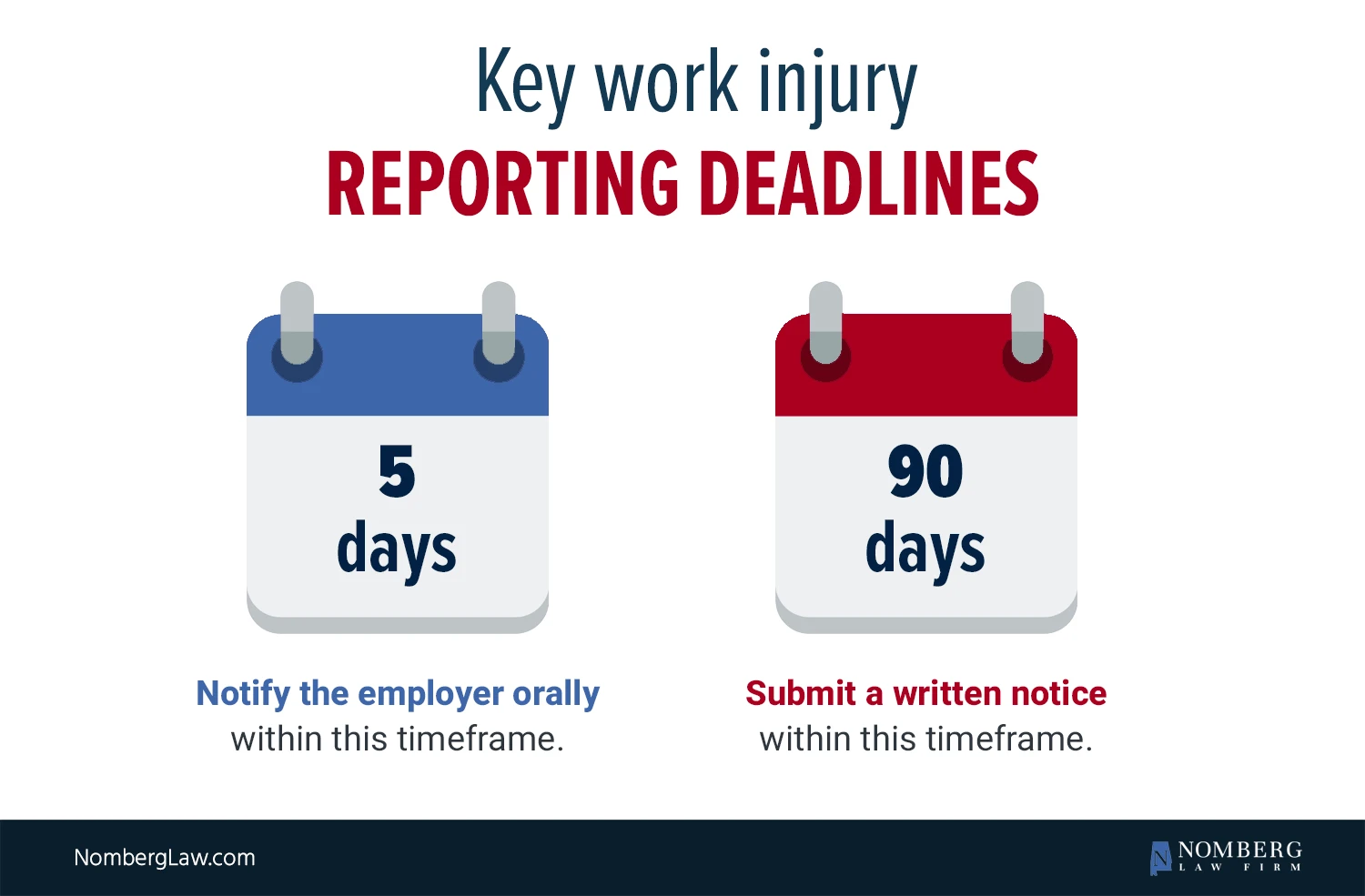Workers’ compensation was designed to pay workers for their injuries on the job without determining who was at fault.
This situation is no longer the case. The employer pays a great deal of money for their premiums. They will attempt to limit any payouts on their policy.
Did you know? Alabama workers’ compensation pays out some of the lowest amounts in the United States. An experienced Alabama workers’ compensation attorney can maximize the payment you receive for your injury.
With over sixty years of combined experience, our work injury attorneys proudly assist hardworking Alabama folks in making sure their rights are adhered to and a fair resolution to their claim is reached.
If you were hurt on the job or your claim is denied, immediately contact our attorneys to discuss your rights. If your medical benefits are not approved, our attorneys can assist you in filing your claim in court to pursue those benefits.
Our experience and dedication are why we are the workers’ compensation attorneys Alabama trusts to help them when they need it.
Are you on the fence about calling a workers’ compensation lawyer?
Get off the fence and make the call.
Our attorneys will talk with you at no charge.
Meet your workers’ compensation attorney, Bernard D. Nomberg
“You work hard to earn a living, but when you are ever injured while working, we can help. We will do whatever it takes to achieve a positive outcome for you.
We have many years of experience serving Alabama employees hurt on the job. We are proud of our track record for achieving results for our clients, and we look forward to providing the same level of service to you.”
Why should I hire a work injury attorney?
You have nothing to lose.
We can assess your situation with a free consultation and provide you with a framework moving forward.
No investment is required initially, so there is no reason not to seek the help of a qualified workers’ compensation attorney.
Additionally, you may be able to get valuable advice if you do decide to pursue the case independently.
Help when things get complicated.
Any complications in your case can get out of hand without the help of a lawyer.
For example, if your claim is denied, a medical procedure is denied, or your benefits are stopped, you will likely need help to remedy the situation. Many workers’ comp insurance companies will deny medical benefits or deny the claim to save the company money, hoping that the employee will no longer pursue the claim.
Most of the time, the employers are right: many injured workers will use their personal health insurance to pay for medical treatment or stop pursuing benefits.
Better compensation with expert help.
Sometimes, the settlement you might have gotten may not meet all your needs. You want a doctor who meets your medical conditions, so why would you not want someone to meet your legal needs?
A lawyer who specializes in representing injured workers has the case law and legal knowledge to get you the best settlement possible.
Avoid hidden costs.
There may be hidden costs associated with your workers’ compensation benefits.
For example, Social Security may be entitled to part of your benefits if you fail to structure your workers’ compensation settlement properly.
A lawyer knows how to draft settlement documents to avoid or minimize any unwanted diminution to your benefits.
Fight employer’s retaliation.
Even worse than potential problems with your claim, you may face retaliation from your employer.
Filing a claim and then losing a job due to the claim can be frustrating and cause undue hardship.
A reasonable attorney will help combat the discrimination and ensure that your employer cannot retaliate due to your workers’ compensation claim.
Receive better financial recovery for complicated cases.
Finally, there may be other parties involved in your case. If you were injured at work due to the fault of another, there might be a potential case to recover from the third party.
An expert workers’ compensation attorney can help evaluate the worth of the case, pull resources of experts to assess the injury and related fault, and properly negotiate a fair settlement.
There are many reasons to hire an attorney to handle your workers’ compensation case. Still, ultimately the decision is yours to make. There’s no harm in at least sitting down and talking with one, so what are you waiting for?
Verdicts & settlements
compensation case
collision case
case settlement
Reviews & testimonials
Find out what our clients are saying about us



What to do when you’re injured on the job in Alabama
1. Report your injury as soon as possible to your employer.
Better to be safe than sorry, GIVE NOTICE. Giving notice is the first step in filing a claim for workers’ compensation benefits in Alabama.
To even have a chance of obtaining benefits from a workers’ compensation claim, the most important thing you must do as an employee is to report the incident to your employer.
Alabama law requires you to notify an employer within five (5) days of the occurrence of the accident. Oral notice is sufficient, but Alabama law also permits written notice, which must be done within ninety (90) days of the accident. We recommend giving notice immediately after an on-the-job accident.
Be truthful and fully disclose the events that led up to the accident and the extent of your injuries immediately following.
By completely disclosing the truthful events of the incident, you will make your claims process easier. A representative of the employer’s workers’ compensation insurance company will not be able to deny your claim based on inconsistent facts if further investigation is conducted regarding the accident.
The most efficient way to safeguard this disclosure of the accident is to submit the incident report in writing to your immediate supervisor and employer.
You must file the claim in writing. When you wait for several hours or a day or two, your employer can claim you did not become injured on the job. Even if your injury is minor, it is important to report it in case it turns into a major problem. Your employer is not required to pay your wages until they are notified of your injury. After giving notice, you should ask for medical treatment and ask to see the workers’ compensation doctor.
Note: There is an exception to this rule for physical or mental incapacity, which makes it impossible to give notice to the employer.
If putting a notice in writing, you must include how the accident happened, a description of the injury, and any witnesses who may have witnessed the accident.
After you give notice of the accident to your supervisor or employer, your employer should submit this information to its workers’ compensation carrier. The workers’ compensation carrier will then process your claim. The workers’ compensation carrier and your employer will approve or deny your claim here.
If your claim is denied, you should immediately contact an experienced workers’ compensation attorney to discuss your rights.
2. Seek the treatment of approved healthcare providers.
How will Alabama workers’ compensation help me pay my medical bills?
Your employer or workers’ compensation carrier will designate your initial treating physician.
Workers’ compensation will pay for your authorized medical care, including treatment, prescriptions, physical therapy, and mileage to the doctor, pharmacist, and physical therapist.
If the authorized treating physician takes you off work for more than 3 days, you will be paid temporary total disability benefits equal to two-thirds of your average weekly wage.
If you do not seek treatment from a doctor, you are dismissing your own claim.
Further, while it is acceptable to see your own doctor, you must see a healthcare provider approved by your employer. The report of this employer-approved healthcare provider will be used to support your workers’ compensation claim.
So, treat with a doctor approved by your employer or the workers’ compensation carrier.
3. Follow the instructions of your approved healthcare provider.
Following the instructions given to you by your approved healthcare provider includes:
- Attending the appointments to meet with your doctor.
- Attending rehabilitation sessions.
- Adhering to the recovery plan created for your injury.
Be on time and attend all appointments.
Supplemental records in your workers’ compensation claim include your doctor’s reports. Failure to follow through with the recovery process created will be noted in your claims process. It could result in the discontinuation of your benefits or dismissal of your claim.
4. Hire an experienced worker’s compensation lawyer.
Timing is the key.
Seeking the advice of legal counsel soon after your injury and before filing a claim could mean the difference between having your claim approved and having to appeal a denial of your claim.
Workers’ compensation can seem murky ground to tread for an employee that has never been injured on the job and is only now beginning to make their way through the maze of requirements to have a successful claim. A workers’ compensation attorney is well-practiced in the art of guiding claims through the nuances required to get your benefits.
An attorney can offer advice on what to say to investigators sent by the employer who wants to reduce the benefits the employer’s insurance policy will have to pay you. The attorney will know how to obtain the most favorable outcome for your specific case, including a claim for compensation against a third party. The earlier you get an attorney involved, the earlier you will be able to have the help and advice of someone that knows the law and is looking out for you.
As we have since 1967, we will continue to protect our clients’ legal rights – those who are hurt on the job while working for Alabama employers.
Alabama accident & injury guide
If you are hurt on the job, you may be unsure about your rights and how to navigate the workers’ compensation process. We’ve compiled resources to help Alabama workers like you understand their options and get the compensation they deserve.
Common work-related injuries
Our online resource is packed with info on all sorts of work injuries, from everyday muscle strains to serious head injuries. Plus, we walk you through the steps of Alabama’s workers’ compensation process so you know exactly what to expect.
What happens after you file a workers’ compensation claim?
Your employer or its workers’ compensation carrier will designate your initial treating physician.
Workers’ compensation will pay for your authorized medical care, including treatment, prescriptions, physical therapy, and mileage to the doctor, pharmacist, and physical therapist.
Suppose the authorized treating physician takes you off work for more than three days. In that case, you will be paid temporary total disability benefits equal to two-thirds of your average weekly wage.
Can I represent myself in an Alabama workers’ comp case?
Sure, you can. But keep in mind when you represent yourself in a claim, your results will not be the same as when you hire an attorney.
Our attorneys will navigate through the system for you and fight for everything you’re legally entitled to. The world of accessing workers’ compensation benefits is not as straightforward as one would hope. Deadlines, rules, and procedures cannot be avoided or worked around to have a successful claim.
Your job and your future depend on obtaining the best outcome possible in your workers’ compensation case. Our experienced work injury attorneys know how to obtain the most favorable outcome for you.
What benefits am I eligible for in an Alabama job injury?
Alabama’s workers’ compensation laws are different from those in any other state. The types of benefits an injured worker may be eligible for will depend on the success of the claim and the nature of the injury they have suffered.
Under Alabama law, injured workers may qualify for the following benefits:
- Indemnification (compensatory) benefits, which are typically two-thirds of the average weekly wage, subject to a ceiling and floor
- Medical benefits authorized by the employer/workers’ compensation carrier
- Mileage reimbursement for authorized medical visits (doctor, therapy, pharmacy, hospital)
- Compensation for physical impairment
- Compensation for vocational disability
- Death benefits
Injured workers also need to know what benefits they cannot receive under the Alabama Workers’ Compensation Act. These include:
- Compensation for pain and suffering
- Compensation for emotional distress or mental anguish
- Reimbursement for full lost wages
- Compensation for loss of consortium
- Punitive damages
During the claim, there are 2 times that the injured worker potentially could be paid. Typically, the first time is after they have been injured on the job, and the authorized treating physician takes the employee off work due to those injuries.
The amount the worker is compensated during this period is calculated at two-thirds of their average weekly earnings for the year before the injury. These weekly checks typically will continue to be paid until the authorized treating physician has released the injured worker back to work in some capacity.
In other words, once the injured worker reaches maximum medical improvement and the doctor releases the injured worker back to work, those checks will then stop being paid. In theory, now the worker is back at work and hopefully making the same or better salary than they were before their injury.
However, the reality is that the injured worker often cannot return to their former job, but their workers’ compensation checks have stopped, resulting in no compensation unless they have found employment elsewhere in the interim.
Hopefully, there is not a long gap of time from then until the other time an injured worker is usually compensated at the end of their claim. That is when it is time either to settle the claim, which is most often the case, or when their case is tried in court and a judge rules.
The sad reality about Alabama’s workers’ compensation laws is that an injured worker cannot be made financially whole. This means that the laws do not allow the injured worker to be compensated for emotional distress, mental anguish, pain and suffering, punitive damages, or lost wages.
The injured worker is typically compensated based on 2 main factors:
- The permanent physical impairment (PPI) rating assigned by the authorized treating physician.
- If they have a “body as a whole” injury, e.g., back or neck injuries, a vocational disability can be considered.
The authorized treating physician assigns the PPI rating as an objective and subjective measure of the injured worker’s permanent impairment and degree of disability. Vocational disability is usually determined after the injured worker can no longer return to their former job or make the same amount of money they were making before the accident that led to the injuries.
Usually, a vocational expert will be hired to interview the injured worker and then create opinions about the vocational disability. This disability is determined by the loss of access to jobs and the loss of the ability to earn.



